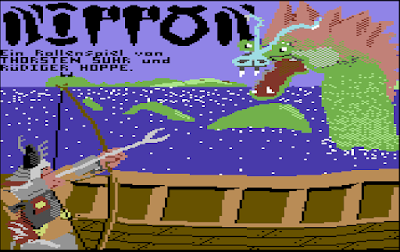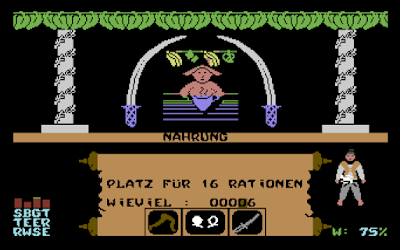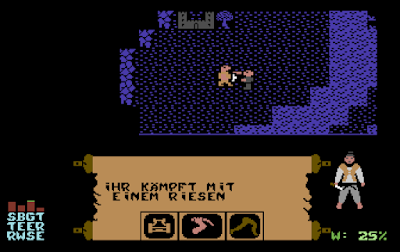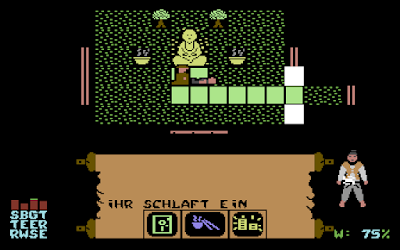 |
| The Avatar arrives on a brand new level. |
I don't normally do this, but this entry will be a complete description of Level 4 and all of my actions and decisions within it. I think that doing this once per long game offers a better sense of gameplay than the summaries I usually provide. I'm going to split this into two parts, but with only a short delay between them. There's a brief summary at the end.
I arrive from the southeast corner of Level 3 in good health but way overloaded. Because it has been a couple days since I played, I forget that I haven't eaten for a while. This has consequences in a bit. I am fighting with an excellent short sword and wearing a mixture of chain and plate armor.
The narrow stone corridor gives me few options but to press forward to a sturdy door. Unlocked, it opens into an area with tall walls and multiple exits. A skeleton comes out of the darkness menacingly but dies in a few hits. He leaves a worn shortsword and a leather cap, neither of which I need.
 |
| By this point in the game, these guys are pretty easy. |
I tend to adopt a "follow the right wall" approach as I explore dungeons, at least initially. Because the automap is so good in Ultima Underworld, I've been less pathological about this than I am in other games where you need a system to avoid missing anything. Still, I tend to keep the general tendency.
A short corridor ends in another sturdy door, also unlocked. I pass a dead rotworm in the passage beyond before coming to a door with an ankh banner atop it. Such doors occur throughout the game and signify civilized areas beyond.
 |
| Here, I'm hoping I'll be able to unload some of these coins in the area beyond. |
The door opens into a huge room full of bones and debris, with wide steps ascending to the right. Non-hostile trolls wander the room freely. Trolls first show up in the Ultima series in Ultima III, and they're often companions of orcs in III and IV. Origin ditched orcs after IV but kept trolls, and of course triggering bridge troll attacks is one of the easiest ways to grind in V. I believe that prior to Ultima Underworld, there has been only one NPC troll in the series--Brigant in Buccaneer's Den in IV--and even he's pretty hostile. Nonetheless, the Underworld manual explains that trolls live under bridges, wield human weapons, and wear human clothes in a desire to be more civilized, and enough civilized examples were found by Sir Cabirus to make a colony in the Abyss.
 |
| Someone who hadn't read the manual would be freaking out right now. |
I pick a random troll and start speaking to him, but he's a "generic," unnamed NPC. Most civilized areas have a few of these, and not only do they share the same dialogue, they'll share the same memories. The next time I speak to one, even a different one, he'll say something like, "Gideon! You're back!"
He "greets" me with "what are you doing here?" My potential responses are: "Canst thou tell me any news?"; "I am searching for trolls to kill"; and "I am merely exploring." Obviously, the second one is going to provoke a fight and I'll probably end up slaying all the trolls. The game is probably technically winnable even if I do but it's bad role-playing. I ask him for news, but he doesn't tell me anything useful.
The next troll I speak to introduces himself as "Rawstag," leader of the trolls, and asks who I am. Again, I have a hostile option--"I am your doom!"--along with two interchangeable ones: "I am Gideon" and "I am an adventurer." I tell him my name, but he insists on calling me "Rodriguez" for some reason that I can only assume is an in-joke at Origin. My dialogue options give me a chance to object, but I don't.
 |
| This dialogue doesn't really go over so well when you're using the brown-skinned PC. |
There's a flexible dialogue option ("Other...") where I can type keywords, but I don't really have anything to ask him, so I ask him to open the door behind him. He wants a gift. I try ale and gold nuggets to no avail. Eventually, I give up and continue talking to other troll NPCs.
The next one is named Lakshi Longtooth, and he speaks in a more genteel way than any troll so far. He doesn't have anything in response to TALISMAN or ARIAL or PRINCESS, but in response to RAWSTAG, he tells me that the king likes red gems. I happen to have one! I return to the king and give it to him, and he opens the door in a corner behind him.
 |
| Isn't "Lakshi" an Indian name? |
The door opens into an ankh chamber. I have a couple of increases to allocate, but I'm waiting to find the mantras for "Sword" and "Lore" specifically so I don't have to use the generic ones and hope those skills are favored. The chamber also holds a piece of paper in which someone named "Lorne" talks about the importance of working together. I keep it but soon forget about it.
 |
| "Yo dawg, I heard you like ankhs." |
I leave the troll area through an unlocked northern door, which leads into a long corridor. The first chamber off this corridor is empty. The second opens to reveal three giant spiders. They take forever to kill--much longer than the ones on previous levels--and they leave me poisoned and my short sword and helmet degraded to "serviceable."
A few things occur to me relative to combat. First, I tend to fight with a mix of chop, slash, and thrust, even though I suspect that each attack is independent and that the enemy AI doesn't respond to patterns or anything. Second, it's really hard to gauge the effective range on attacks. Enemies constantly dart in and out of the range, whatever it is. Third, I think this is the first game to offer the experience of seeing your weapon clearly make contact with an enemy and yet somehow still "miss" because of the underlying statistics. This is a common criticism of Morrowind, but the discontinuity exists every time you blend action combat with underlying probability rolls.
 |
| Are any of you capable of shape-changing into gorgeous women? |
I have no way to cure poison, so I have to tough it out. I boost my hit points with a few castings of In Bet Mani and hope the poison fades before it kills me. About this time, I notice that my character is "famished," having apparently forgotten to eat after he woke up on the previous level. I'm relying on catching fish and In Mani Ylem for food these days, but I just spent all my spell points and I'm nowhere near any water that I know of.
I search the spiders' room. It contains a mandolin, several cauldrons, a bowl, and a scrap of paper with "music and lyrics to a popular troll fight song." I already have a mandolin in my inventory, and for the first time I try to "use" it and find, delightedly, that just like the harpsichords in Ultima V, you can actually play it with the 0-9 keys. I fool with it for a while to avoid dealing with my inventory problem.
Unfortunately, that scrap of paper has put me over the top and I have to set aside some other things. Noting the bowl on the floor, I hit upon the idea of consolidating a few items by making the recipe for rotworm stew. I'm sure I'll need it eventually. I rush back to the entrance where I saw the dead rotworm, grab it, and mix it in the bowl with some port wine and a green mushroom, then "use" the recipe. Unfortunately, the weight of the bowl offsets the savings gained by losing the port wine, mushroom, and recipe.
 |
| Doesn't this require any cooking? |
At this point, I'm more concerned with hunger than weight, so I head back to the trolls to see if I can barter for some beef flanks or something. On the way, I run into a troll that I missed the first time. His name is Sethar Strongarm. He immediately goes on about how his mother used to make rotworm stew and he'd really like a bowl. I swear to you, this was a coincidence. I knew someone would want the stew, but not that he was next door.
 |
| You're not going to believe this . . . |
I give it to him, relieved to give up that bit of weight. In return, he gives me some dragon scales . . . which weigh more than the stew. Damn it. (I'm aware that both my encumbrance and food problems can be solved if I just take the time to go back up to Level 3 and my treasure cache, but I stubbornly refuse to do it for some reason.) Finally, I deal with the weight issue by trading a few gold nuggets to trolls for food, then eating the food. Even after a couple of portions, I'm still "famished." Food hasn't been a problem all game, and now I suddenly can't get enough.
 |
| A troll thinks four gold nuggets for some meat on a stick is a bad deal. In the real world, four gold nuggets of 3 ounces each would be worth over $5,000. |
Moving on, I open the next door off the hallway. It leads to a dropoff. I can see a skeleton milling about below. My general rule is that as I'm following the rightmost path, I don't take any path I can't return from, like jumping off a ledge. I leave this area alone for now.
The next door opens into a room with four headless. I kill them, but I have to quaff a potion in the middle of the battle. Now I'm in bad shape--hardly any health, no magic, and starving. I need my few regenerating spell points for In Lor ("Light"). Adding insult to injury, the headless' room has nothing of value except gold coins I don't need and can't spare the weight to carry.
 |
| One of these guys isn't so bad. |
A northern corridor bends west towards the top of the map and puts me on a raised platform. A mongbat attacks me, but he dances away when I try to retaliate, and I just run past him rather than dealing with him for now. (Why do I always want to call them "mobats"? Is there a game in which giant bats are called "mobats"?)
Without incident, the long corridor turns and starts moving down the west side of the level. I soon encounter a warrior named, amusingly, "Biden." Using friendly replies, I elicit from him a long story. He is a member of the Order of the Knights of the Crux Ansata. (If you're curious, crux ansata means "handled cross" in Latin, and it's been applied to the ankh in various writings since at least the eighteenth century.) Another member of the order, Sir Rodrick, went crazy, began calling himself the "Chaos Knight," and has taken over the northern area. (It turns out I literally ran over his head on the way here.) Biden went to defeat him but was wounded and lost his sword. He's hanging out in the hallway because he's too ashamed to go back and face his brethren. I tell him I'll try to succeed where he failed, and I move on.
The corridor soon announced my arrival in another civilized area with ankh banners flanking a sturdy door. I'm going to summarize a little here. The stronghold of the Knights of the Crux Ansata takes up most of the southwest region, or about half of the western wall and half of the southern wall. It consists of several large rooms. The commander, Dorna Ironfist, hangs out in a room with a couple of pools of water. Nearby is the door to an "armory" that no lockpicking will open.
 |
| Announcing the entrance to the knights' area. |
The first set of rooms has a couple of gravestones commemorating Sir Lionir and Sir Avirill. These become important later.
 |
| Aaaargh! Why do they show regular crosses instead of ankh crosses!? |
One room seems to be a library and holds a bunch of scrolls. All of them offer important hints. They say:
- The maze conceals many chambers. One is said to lead to a chamber once used by the knights.
- Lorne went to the homeland of the Trolls in the hope of building a shrine.
- To pass into the unseen, jump through the seen.
- The maze is locked with a key that is now thought to be lost.
- The heights of the north have a hidden counterpart.
- The bullfrog puzzle has a simple solution, but there is more than meets the eye in that place.
There is a lot of dialogue in this area--more than twice the amount in the game so far. None of the knights is "generic." These are summaries of my conversations.
Ree tells me that things were pretty cool when Cabirus was alive but fell apart when he died. The Knights try to maintain order and restore glory by sending knights on quests, but they're fighting a losing battle. On some level below, there's a golem on an island surrounded by lava, and knights used to test themselves against the golem. He's indestructible, but he'd give a reward if you fought well. She suggests I speak to Dorna Ironfist if I want to join the order.
Feznor fills me in on some of the puzzles alluded in the above scrolls: The Puzzle of the Bullfrog, the Maze of Silas (with the Door of Precious Levers), and a watery area to the west "of the Abyss' volcanic core"--this latter term making its appearance in the game for the first time. He offers detailed descriptions and hints for the puzzles.
- The Puzzle of the Bullfrog is an area in the northeast surrounded by water. I have to use levers and buttons to create a "safe path" to the other side. There's a wand that will reset the puzzle if I screw it up.
- The Maze of Silas is strewn with creatures and bones and has a bunch of hidden chambers.
- The Puzzle of Precious Levers is at the end of the maze. The order in which to pull the levers "can be gleaned through careful examination of the artifacts of our order."
He also warned me about hostile trolls living outside the friendly, civilized area.
 |
| And now the worst trolls have to be "dark" trolls. Man, the Abyss is so racist. |
Trisch laments the downfall of Cabirus's vision and says things are getting worse. Just recently, some madman burgled a bunch of torches and lanterns, including the Taper of Sacrifice. I know immediately that she must be talking about Zak from Level 3, who is afraid of the dark.
Derek, in a room marked "treasurer," says that he doesn't go adventuring. Instead, he carves gems and works metals, but he needs a proper tool. I immediately give him the gem cutter that Goldthirst gave to me. (Maddeningly, it didn't reduce my weight at all.) In return, he tells me that the Ring of Humility is in a room on the next level, and he gives me the order in which to flip various switches to get to it.
 |
| I don't think giving you the gem cutter demonstrates "humility" exactly, but I'll still take the hint. |
Meredith gives me the mantra to improve the "Missile" skill; Cecil does the same for the "Mace" skill; Kyle for the "Axe" skill; and, at last, Doris gives me the mantra for the "Sword" skill.
Finally, I meet Dorna Ironfist, who turns out to be a man, in his chambers. When I tell him I want to join the Order, he puts me through a little test. The first is simply who I am. I have options to answer "A valiant warrior, skilled in combat and magic"; "A noble of Britannia, worthy of knighthood," and "the poor son of my mother."
 |
| Notably, "The goddamned Avatar" is not an option. |
Let's think about this. "Valiant" is too much. It lacks humility. The second option is just a lie. The lord of Questron made me a baron, but Lord British never extended such courtesy. He just yanks me through the moongate when he needs me and tosses me back when he's done. Thus, we go with the third, even though I'm more upper middle class.
After asking if I'll submit to their justice, he orders me to drink a cup of poison that he says will kill me. I obey, and it turns out he meant figuratively: "He who drank from the cup is now dead. In his place stands Gideon, Esquire of the Order of the Crux Ansata." He asks if I was afraid, and I say yes, because I was worried the cup was going to end up in my inventory, but in any event, that's enough.
As an Esquire, he gives me my first quest: to find the Writ of Lorne, one of the first knights to settle in the abyss. As it happens, I have the damned writ in my backpack. I found it in the trolls' ankh shrine. But I've forgotten by this point, so I make a note to head to the troll area and ask about it.
Dorna tells me about the various artifacts of virtue and says that in addition to the stolen Taper of Sacrifice, he knows of the Standard of Honor, which will be given to someone who accomplishes "a sufficiently honorable deed." I assume I could also kill him for it, but I'll leave that to a different sort of role-player.
During this process, I have been casting In Mani Ylem as frequently as possible, and my hunger goes from "famished" to "hungry" to "peckish." As I finish with the knights, In Lor runs out, and I have no other way to make light. Since I'm almost back to the stairway, I decide to feel my way through the dark. On the way, I find a silver ring in a pile of debris.
 |
| My map of Level 4 so far. |
Only a battle with a skeleton stands between me and the stairs to Level 3. Returning to the previous level, I find the river, fish, and eat fish until my stomach is stuffed, then go to sleep in my secret chamber. When I wake up, I eat more fish until I'm full again and, for the first time in several hours, march off with full vitality and mana jars.
Continued in Part 2 tomorrow evening.
Summary: Arrived on Level 4, visited the troll area, traded rotworm stew for some dragon scales, visited the Knights of the Crux Ansata and joined their order, got a bunch of hints as to the various puzzles remaining on the level. Got beads on the Taper of Sacrifice, the Ring of Humility, and the Standard of Honor. Struggled with food and encumbrance the whole time.
Time so far: 14 hours



















































